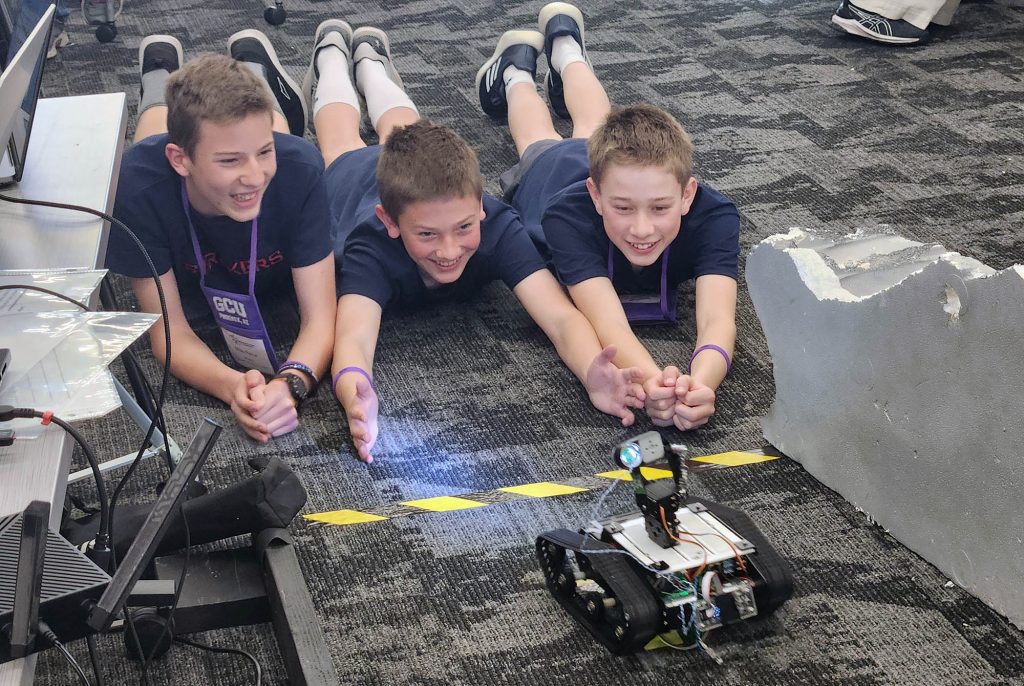
“William! I need emotional support,” declared one junior high school student, grasping his team’s robot in Grand Canyon University’s Echo Building.
Something wasn’t working, and he wasn’t the only one feeling the stress of competition.
Students from around the country – not counting two teams from Nigeria and the Dominican Republic that competed virtually – packed the light-infused (and today, not so roomy) room in Echo. Teams tinkered, tweaked, created, invented and pivoted to fix last-minute robot problems.
The chitter-chatter was high in the Robot Search and Rescue event, one of five science, technology, engineering and math challenges that junior high and high school students tackled at the International Christian STEM Competition on Saturday.
It was the third time GCU hosted the burgeoning event with the Association of Christian Schools International.
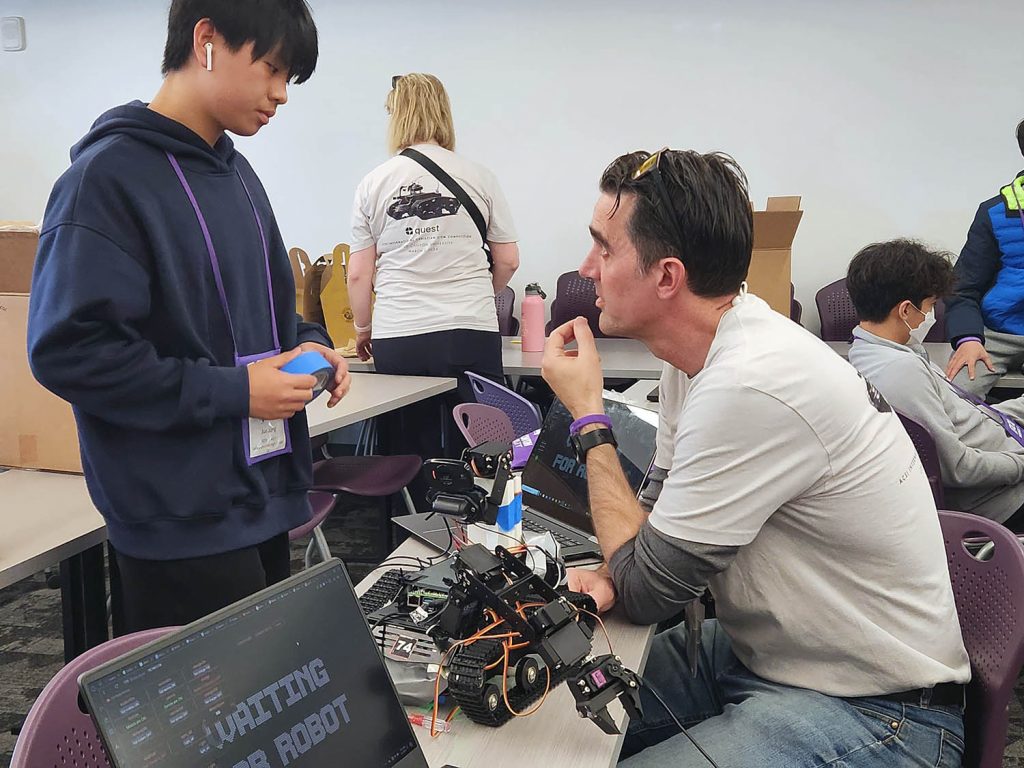
“From our first year, it has tripled in size,” said GCU’s Assistant Vice President of K12 Outreach and Education Program Development Dr. Carol Lippert. The K12 Educational Development team weaved from room to room to make sure the event ran smoothly.
When the competition debuted in 2022, GCU wanted to be involved in an innovative event that served Christian schools, which sometimes struggle when it comes to STEM.
“This is the only multidisciplinary international STEM competition focused on Christian schools,” said Dr. Cori Araza, GCU senior project director of K12 STEM Outreach.
This year, 25 Christian schools and 256 students traveled from across the country to get those neurons firing in challenges that incorporated the Christian worldview element.
Students tested their skills not just in the Robot Search and Rescue event but also the Innovation in Service: Assistive Technology Challenge, in which students built prototypes to assist individuals with disabilities; the Onsite Design Challenge, where competitors solved a problem revealed to them onsite; the Ethical Artificial Intelligence Game, which gave competitors the chance to design, plan and build an interactive game using artificial intelligence controlled only by gestures; and the Aerospace Design challenge, in which teams created a launching device that propelled an aircraft toward a target.
Back in the Echo Building, an announcer spewed commentary from the competition floor: “That’s a first!” he said excitedly about one robot’s design. “A shotgun laser on the arena floor!”
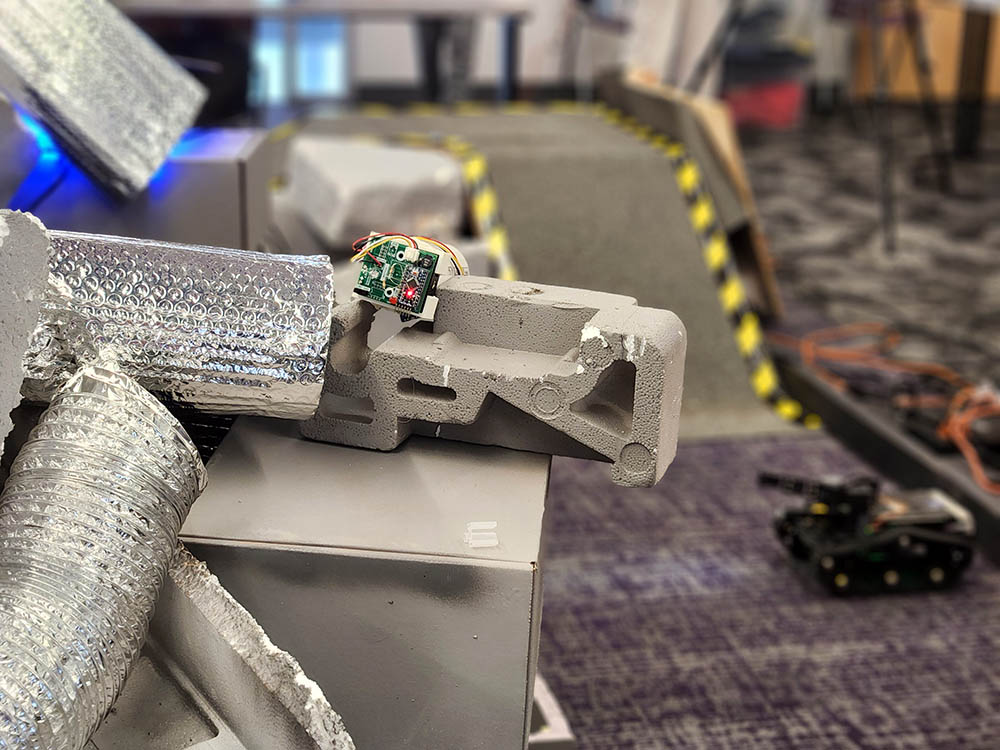
The competition floor was designed to look like a craggy mountain area with artificial flames whipping from the top of the rocks and a plushie of Thunder stuck in a cave below.
Competing robots had to scale the mountain, elevating up one side and down the other before making it through a cave and then onto the finish line.
Students were charged with building and programning a robot that aids rescuers in clearing debris, securing safe passageways and saving lives after a disaster.
Junior high student Isaac Ruddell of Flagstaff Christian School’s Strikers robotics team leaped into the air and grabbed teammate Jarren Ojanen by the shoulders, a big smile across his face as his team’s robot successfully made it through a treacherous part of the obstacle course – an accomplishment met by cheers from spectators
Ruddell, who has competed in FIRST LEGO League, said he has coded robots before and is “used to them NOT working, so just seeing us get through the cave, it was nice.”
Not that the competition wasn’t fraught with drama.
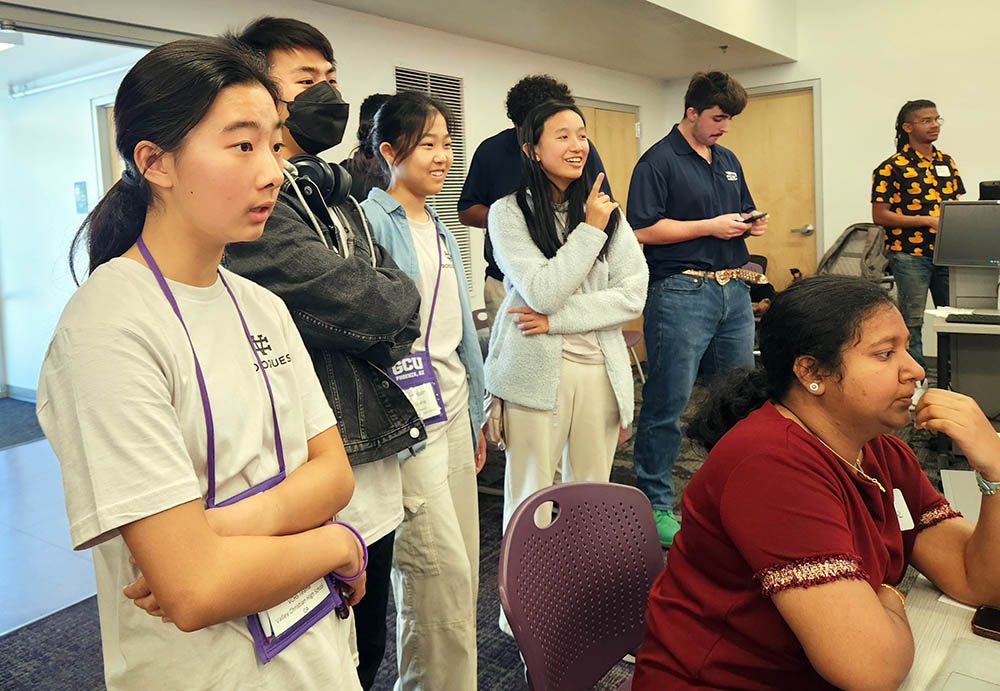
A fellow Flagstaff Christian School team couldn’t get their robot to work so borrowed the Strikers’ robot, breaking its arm in competition. It was a minor tragedy that worked out well for the Strikers.
“It was better (without the arm), because we were able to get up and down the hill,” said Ojanen.
Teammate Miles Pierce reflected how the robot’s camera kept turning off and on during competition: “It was stressful,” he said, as it was for eighth-grader Luke Barrick, team driver, who was separated in a special driver area in the back of the room. But “I could hear them yelling,” Barrick said.
The K12 Educational Development team partnered this year with nonprofit Quest 4 Excellence, which provided the platform for the robotics competitions, including the curriculum and obstacle course on which the robotics teams competed.
Danny Kim, a Cornell University computer science alumnus and founder/chief technology officer of an international security software firm, helped found Quest 4 Excellence after he offered his tech skills as a parent volunteer to his sons’ school, Valley Christian Schools in San Jose, Calif.
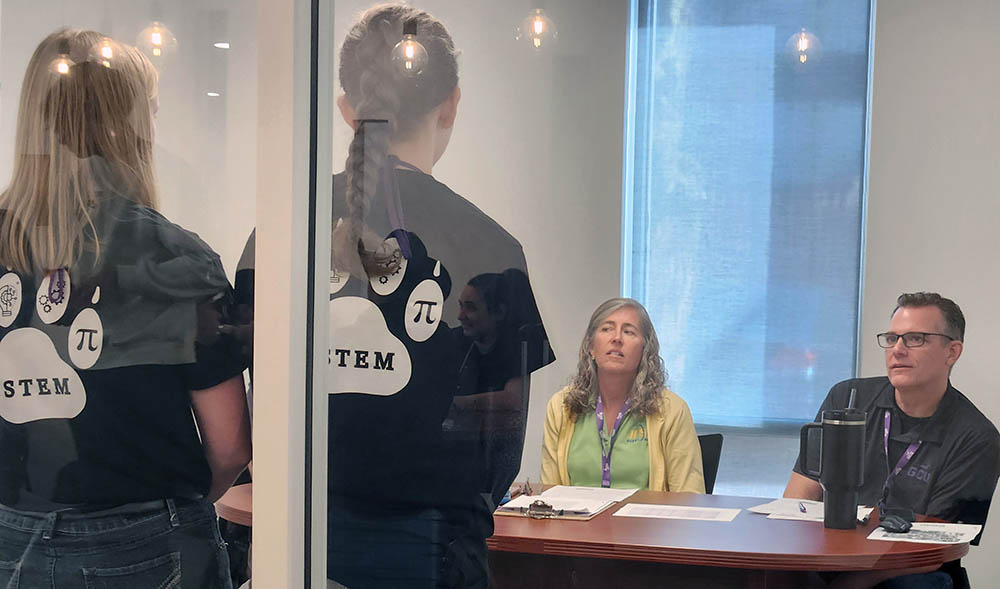
The school was once on the brink of closure but found success, in part, by tapping into professionals like Kim. He went from parent volunteer to running the school’s K12 STEM program (which includes a research-and-design team) to CEO of Quest 4 Excellence. The nonprofit started by the high school develops project-based learning courses focused on space, ocean and robotics to inspire students to purse careers in STEAM (STEM with art added to the mix).
Part of the nonprofit’s work is creating competition platforms for events like the International Christian STEM Competition.
“We felt that this was something we needed to share with the rest of the world,” said Kim of expanding Valley Christian Schools’ success in STEM innovation to other schools.
Quest 4 Excellence recently was involved in a competition in Malaysia.
“This is my passion,” Kim said. “ … I see the impact it makes on the kids. The one we did in Malaysia, earlier this year in January, we had 167 kids come. Forty of them were from refugee schools. Afterward, I went and visited a refugee school, and there was even testimony on how this has changed their life, their whole trajectory in life.
“So it’s truly more than giving them a fun thing to do. When they realize they can actually build something, a robot from scratch, and be able to run this, program this and drive this, their thought is, ‘What else can I do that people told me I can’t do?”
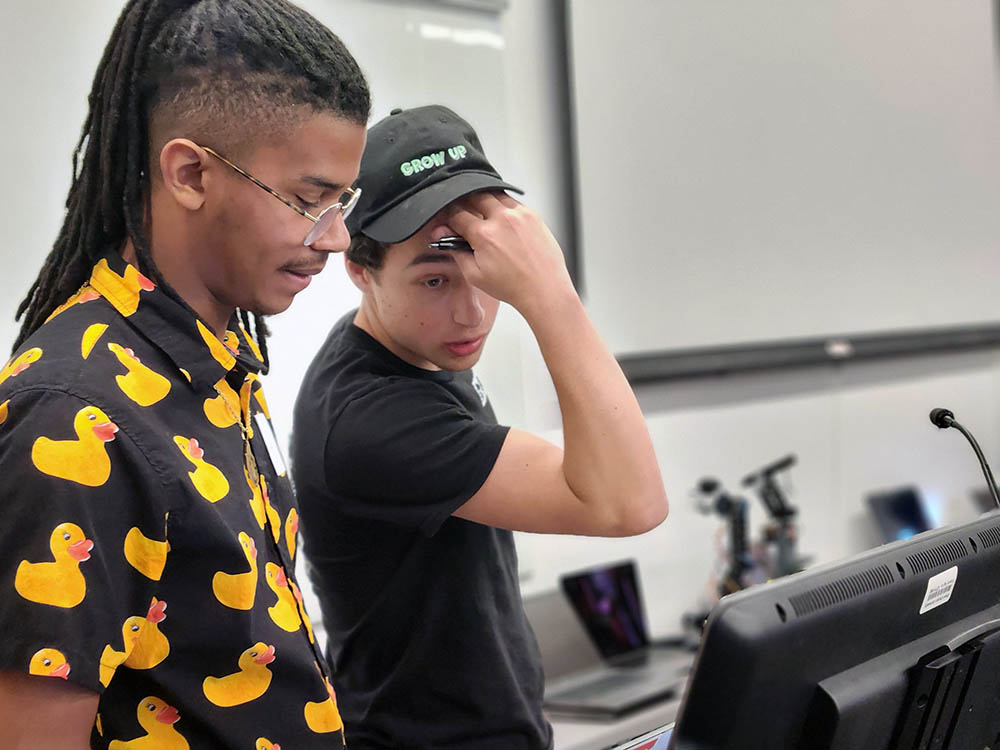
GCU alum Trevor Baines, the founder of Arcane Security with GCU student Diego Briceno, is working with Quest 4 Excellence on advancing that STEM mission for K12 students.
Baines, who was volunteering Saturday, helped create a cybersecurity course for Valley Christian Schools. He works with K12 teachers and students remotely to teach fundamental cybersecurity skills.
He loves to volunteer at K12 events.
“It’s cool because I got to be here the very first year when we first brought it to GCU and now seeing how big it’s gotten. … I never had anything like this when I was growing up in high school so, again, helping out and giving to the students now, I love that stuff,” Baines said.
In GCU’s Catalina Building, next door to the robotics challenge, Flagstaff Christian School’s Asher Pederson and Benjamin Chance were in an interview room with judges following their round in the Aerospace Design competition. Talking with judges to explain a design and share thought processes constitute a bulk of the points earned in the event.
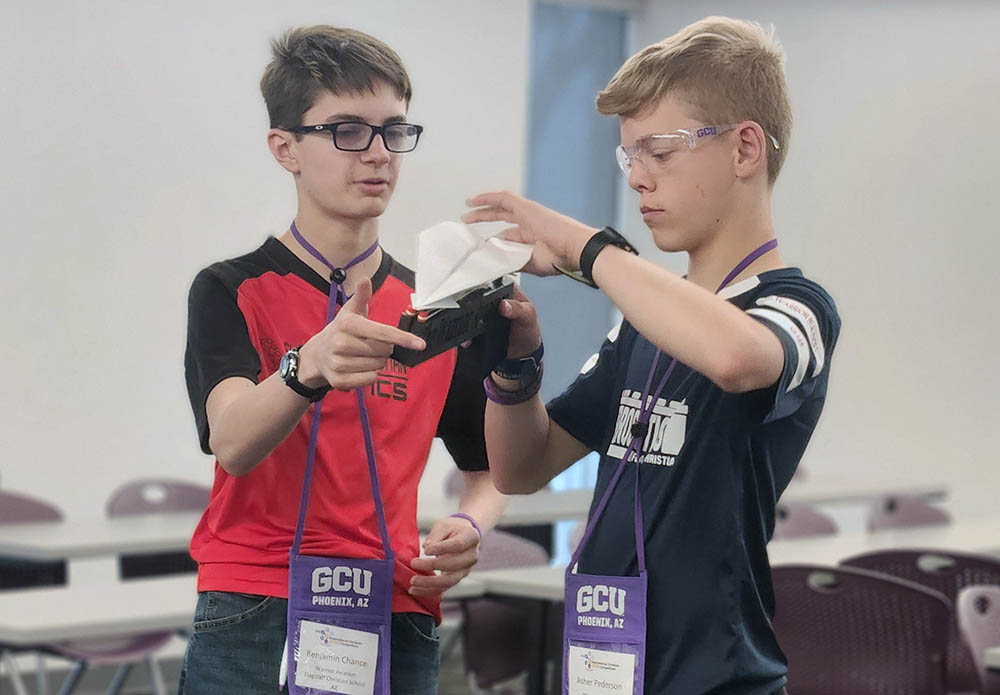
Pederson, Chance and a third team member who couldn’t make it to the competition designed and 3D printed a paper airplane launcher, but the launcher’s trigger broke at school.
“In Asher’s words, we weren’t at the scene of the crime,” said Chance with a smile of the demise of the trigger.
They improvised and carried on.
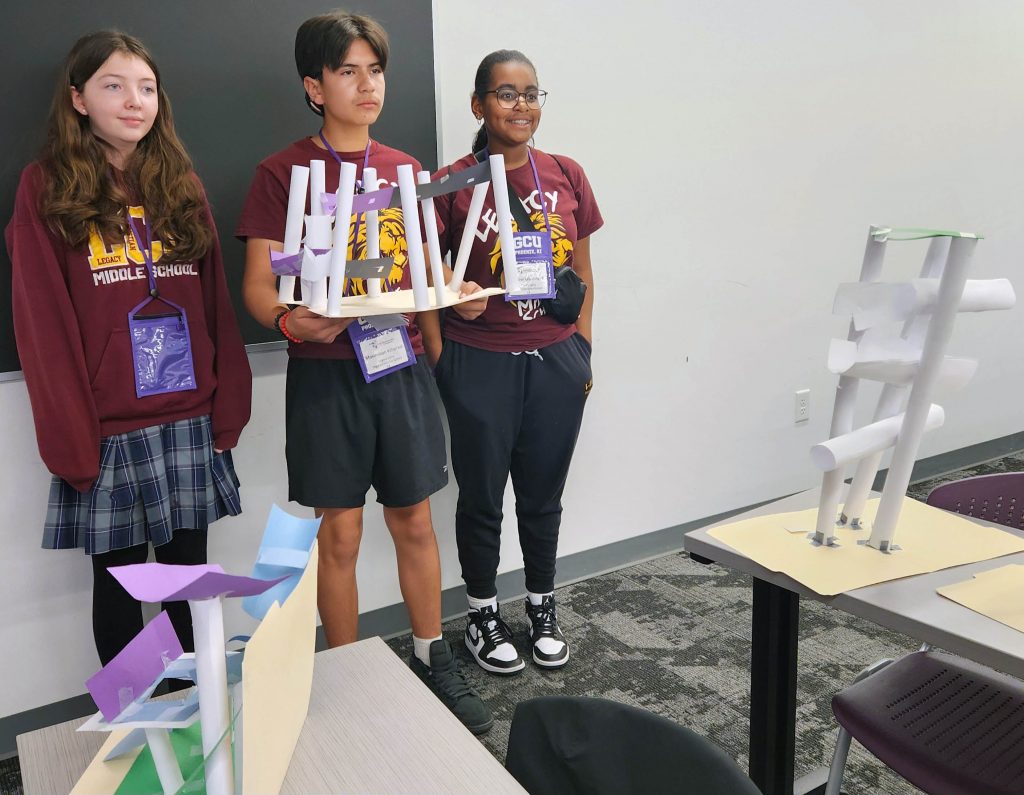
The most exciting thing about the competition, Chance said without hesitation: “Launching it!”
Just down the hall, teams competed in the Onsite Design Challenge. Students had to design a series of ramps that would take a ball to the end of those ramps in the slowest amount of time.
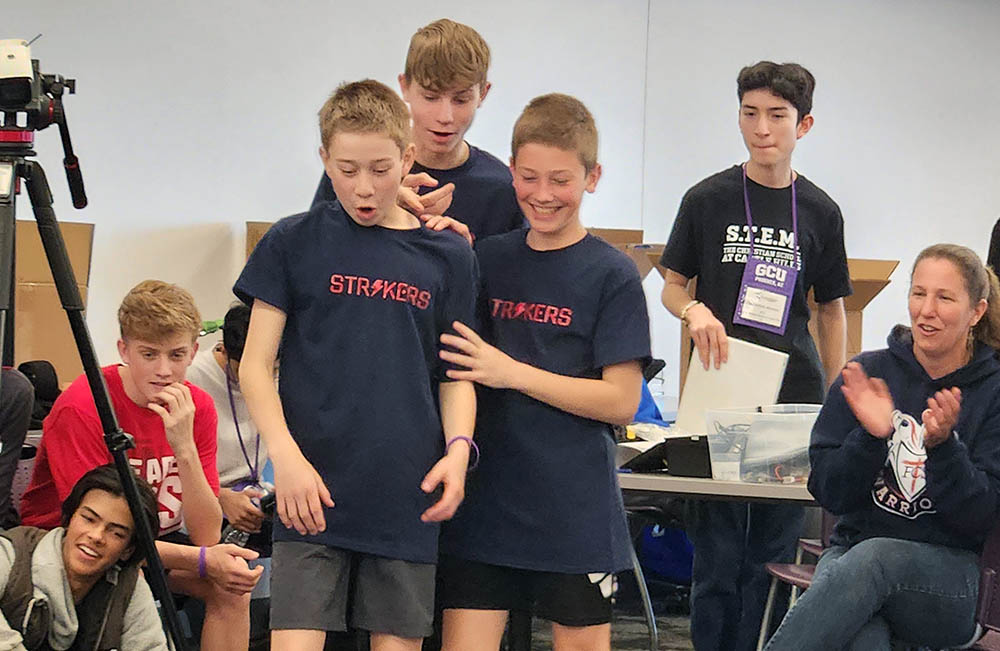
Teams had 90 minutes and just paper, tape, scissors and a Manila folder to create the design.
“It was just exciting building it and working together,” said eighth grader Maximilian Villarreal of Legacy Christian School.
What was exciting for GCU was not just engaging students like Villarreal, Lippert said, but also “helping them to see how they can bring their Christian worldview and morals to solving problems through STEM.”
GCU Manager of Internal Communications Lana Sweeten-Shults can be reached at [email protected].
***
Related content:
GCU News: Competition embraces STEM through a Christian lens
GCU News: GCU, MESA have designs on helping engineer STEM careers









































































